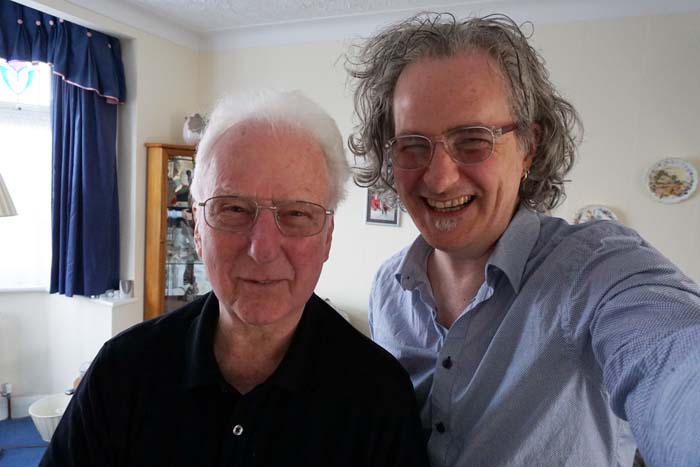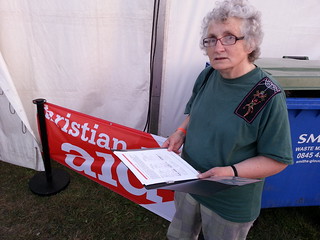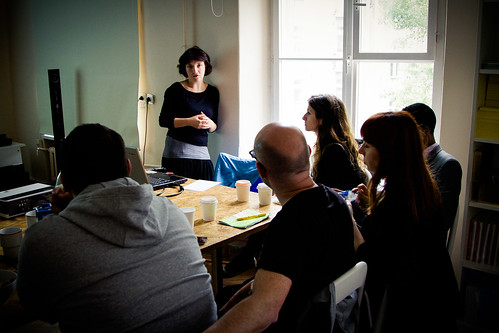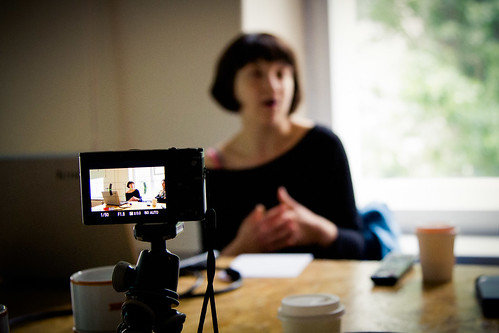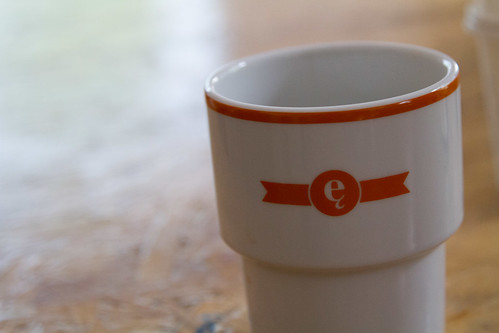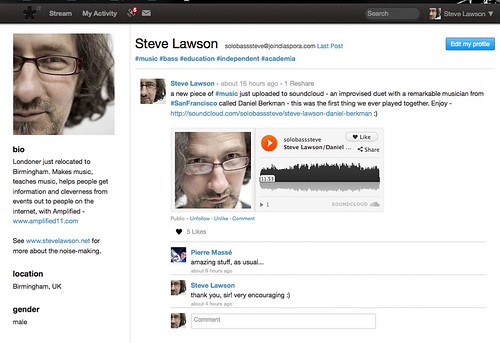Fathers’ Day : A Story
It’s Fathers’ day, and I guess like many people, my dad is someone who has variably inspired me, infuriated me, looked after me, annoyed me and… well, fatherhood is complicated, right? So instead of getting too deep into that, I’m going to tell you a story about the coolest thing my dad ever did.
It was some time in the late 80s – I don’t know the year, cos I’m not one of those people who keeps track of stuff like this… I could probably work it out if I knew where the photos were from that time, but I don’t, so we’ll stick with late-80s. At this point, neither my brother nor I had been on a plane – we’d be abroad on holiday, but only to France (I’d been on a French exchange trip, and my dad had taken us on a camping trip to Brittany when we were younger).Â
We were down seeing my dad for a few days in one of the school holidays – at this point, we lived in Berwick On Tweed, and he lived in East London. Modern complex families being what they are, we made the best of it, and I learned how to get from Berwick to London on public transport at an age young enough to be deeply alarming in these times of stranger-danger and social media horror stories that lead us to believe that every human left alone below the age of 35 for more than 15 seconds will be immediately abducted and locked in a dungeon for 25 years. However, I think on this occasion we got a lift down to London with a friend from Berwick who also had family in London.
When we got to my dad’s, he told us that his friends were heading off on holiday for a week and we were going to go and take them to the airport. I can’t exactly remember how or why our bags ended up in the car too, but they did {EDIT see below for my sister’s recollections}. We got to (I think) Gatwick (I say ‘I think’ – I’ve not researched this for a thinkpiece in the Guardian, I’m just running on memory) and I started pretending that it was me that was off on a plane to Spain on my holidays. Having never been to Spain or on a plane, this was in no way ironic, and I was play-acting the height of perceived opulence and sophistication. I was swinging my camera around in a tourist-y way and towing a suitcase (come to think of it, our stuff may have actually been packed into a suitcase we didn’t know was ours, and we thought belonged to my dad’s friends) and talking about all the fun I was going to have in Spain.
As the time for my dad’s friends to check in approached, my dad turned to my brother and I and said, ‘come on then, we’d better go and get checked in’ with a big grin on his face. We laughed and were happy to wave goodbye to his friends. But then he said it again, ‘no, we need to go and get checked in, we’re off to Spain’.Â
{EDIT} Right, here’s what I knew would happen! I posted this on FB and tagged my sister, knowing that she’d remember it better than me – here’s what she said:
“The story was you guys were going to Somerset to look after the house while [dad’s friend] Sandy and family went to Spain. Therefore you needed stuff for your holiday, so that’s the need for suitcases. Also as you were going to use Sandy’s car for the duration of your stay at his house. [dad’s neighbour] Elaine had to drive you to Gatwick to collect their car but you did not know where it was parked so you took your bags into the airport so you did not need to return to Elaine’s car once you discovered where Sandy’s car was. Oh the elaborate lies!! Anyway meet up with Sandy and family and [dad’s friend, wife of Sandy] Val gives you an envelope of house rules, what to feed the dog, where the car is parked, places to visit etc but when you open it it’s a flight ticket! Oops must be wrong envelope, we say. Whose name is on the ticket? Queue screaming, surprise, tears, (mainly mine!) and [brother] Kev asking if mum knows about this? Was a fantastic surprise to be a part of!!”
{/EDIT}
He’d managed – in collusion with my mum and sister, to get our passports smuggled to London, to get a bunch of holiday-in-the-sun stuff packed surreptitiously in our cases and got us as far as THE CHECK-IN DESK an hour before the flight before we knew we were going on Holiday, on a plane for the first time. It was utterly amazing, brilliantly planned and we went to Spain and had a fantastic time.
I still remember the overwhelming emotion and excitement of that moment of realisation. It was like the shit that happens at the end of dream-come-true TV shows, where something seemingly impossible is dreamed up by a production team and a massively elaborate plot is hatched by a full-scale TV crew with a budget to amplify and leverage someone’s emotions for money, and Cilla-Black-or-whover-is-Cilla-in-the-new-millennium gets in their faces and squeezes every ounce of TV-juice out of them. Except this was just my dad being awesome. He didn’t get anything out of it at all. He just liked doing cool shit like that.
Like I said, my relationship with my dad is complicated, but I 100% want to be the kind of dad that will spend months planning a surprise for his kids that will blow their tiny minds. Just because I can.
-o0o-
Happy fathers’ day. And peace to you if the memory of your dad is painful, if the word ‘father‘ actually conjures images of being unsafe, of being hurt, of something you needed to get away from. Being human is a complicated mess, and becoming a parent doesn’t make you a superhero. Terrible people have kids, amazing people have kids. Sometimes terrible people step up and parenthood is the making of them. Sometimes people who appeared amazing are brought down by the responsibilities of parenting. There are no givens in all of this, and we need to find ways to understand our own journeys that inspire us to be better people. As parents, we need to grab those moments of inspiration and replicate them, while taking note of the things that were negative and consciously avoid replicating them.
But srsly, go plan a surprise for your kids, if you have them. Surprises are amazing x
Social Media at #TheDWord – Collectively Asking Better Questions
Last monday, I had the privilege of helping to plan and implement a social media strategy for a conference on Diversity in Theatre and Live Art, called The D Word, hosted and planned by nitroBEAT. (the hashtag was #TheDWord on Twitter if you want to have a dig through the archive, and nitroBEAT’s twitter account is worth a look/follow too – @nitrobeatuk)
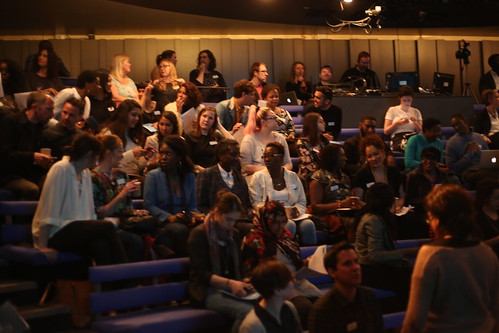 It’s an area of discussion in the arts that is fraught with potential pitfalls – and for the event itself, carried the risk of not getting the people who most need to be in the room in the room, missing the tone of the discussion the audience WANT to have in the choosing of the talks, leaving people feeling talked at not with… It also was designed to build on – but not be constrained or engulfed by – the ongoing discussion around the deeply controversial work Exhibit B, that was canceled at the Barbican late last year after protests.  So what role social media in that setting?
It’s an area of discussion in the arts that is fraught with potential pitfalls – and for the event itself, carried the risk of not getting the people who most need to be in the room in the room, missing the tone of the discussion the audience WANT to have in the choosing of the talks, leaving people feeling talked at not with… It also was designed to build on – but not be constrained or engulfed by – the ongoing discussion around the deeply controversial work Exhibit B, that was canceled at the Barbican late last year after protests.  So what role social media in that setting?
The D Word was planned as a series of 6 ‘Ted-style talks’, of about 15 minutes each, with breakout discussions to explore the ideas further, broken up by coffee times and lunch. So we had a number of distinct areas where social media’s role and impact had to be considered. Continue reading “Social Media at #TheDWord – Collectively Asking Better Questions”
Bending Towards Justice.
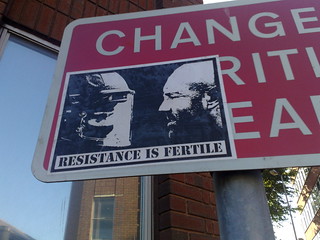 MLK paraphrased Theodore Parker when he said “The arc of the Moral Universe Is long, but It bends toward Justice”
MLK paraphrased Theodore Parker when he said “The arc of the Moral Universe Is long, but It bends toward Justice”
Parker’s whole quote feels a little more fitting now, a little more shaky, a little less certain, but full of faith that good will out. He was talking about the abolishionist cause, still in the age of slavery…
“I do not pretend to understand the moral universe; the arc is a long one, my eye reaches but little ways; I cannot calculate the curve and complete the figure by the experience of sight; I can divine it by conscience. And from what I see I am sure it bends towards justice.”
I see little movement towards Justice in the election of the Tories for a 2nd term. Justice is about as far from their desire to ‘redefine the word fair’ [Cameron: 2012] as it can be. Continue reading “Bending Towards Justice.”
How Not To Organise A Protest (Loretta-Aid: The World’s Most Unpopular Petition)
Like many other people, I was deeply concerned when at the beginning of August, The Daily Telegraph brought it to our attention that many of the Chief Executives in the UK’s biggest charities (specifically those that make up the DEC – Disasters & Emergencies Committee) were being paid 6 figure salaries, and that the number who were had risen sharply in recent times. Despite charitable giving falling.
It was of particular interest to me as a supporter of Christian Aid, that their Chief Exec, Loretta Minghella, is being paid £126,206 a year.
That’s quite a lot of money for a charity that says that £21 could feed three families, suffering after the floods in India, for a month. That seemed to me like a better use of some of that money. Given that, obviously, it doesn’t cost £126,206 p.a. to live in the UK. In Christian Aid Campaign terms £126,206 could keep a heck of a lot of families fed for a month even in the UK!
However, Christian Aid’s response was interesting. they pointed out that she’d taken a sizeable pay cut, from the £280K she was making before joining Christian Aid, and was thus pretty good value for money.
Well, that changed my mind, I can tell you! Why should someone who previously worked in Financial Services dealing with bankers have to put up with a drop in pay like that just because most of the folk helped by  the Charity she’s Chief Exec of are living on less than a couple of dollars a day? It’s an outrage.
So, my mum and I set up a petition at Greenbelt, which we dubbed Loretta-Aid, to get Christian Aid to donate half of the money they raised at the festival to Loretta, to help top up her ailing salary! After all, if she was used to a 280K a year lifestyle, the drop could have had a seriously detrimental affect on her…
Steven Buckley, head of communications at Christan Aid, asked to meet my mum to talk about Loretta’s pay. He seems to think £126K is quite a modest salary for someone of her skills and experience. Perhaps we should have asked him to sign our petition. He was also afraid we were going to stage a protest in the Christian Aid marquee and upset the people working there, but why would we do that? They aren’t on a 6 figure salary; they are volunteers.
But, a sad thing happened. We couldn’t get anyone to take us seriously. Everyone we asked to the sign the petition laughed! A few people signed it with fake names (unless there really was someone called Gandalf at Greenbelt Festival). We had a pretty poor list of names by the end of the festival, and as such, decided not to hand it in.
Here’s my mum with the petition outside the Christian Aid tent, deciding not to hand it in:
The only thing we could conclude was that for Christian Aid supporters, using their donations to prop up the sizable salaries of executives was not a good use of the charity’s money. Indeed, many might agree with William Shawcross, the chairman of the Charity Commission, who warned in the Telegraph article that charities were risking their reputations if they were not seen to get a grip on boardroom excess.
So, perhaps a rethink is in order, eh, Christian Aid? You’ve got to do what you think’s right, but even an argument as compelling as ‘it’s not as much as she got paid for paying compensation to bankers’ didn’t seem to wash with your supporters at Greenbelt…
Here are Christian Aid’s various responses to the topic:Â
http://www.christianaid.org.uk/aboutus/index/ceo-salary-debate.aspx
http://www.christianaid.org.uk/aboutus/news/ceo-salaries-a-heartfelt-message.aspx
Thoughts on Russia, Homophobia and Protest
OK, interesting stuff brewing over the response to the Russian govt’s hideous new anti-gay laws. The consensus is, of course, that they are an horrific human rights abuse, and we need to do whatever we can to help change the minds of the Russian authorities.
However, the mechanism is a bit more hotly debated.
Stephen Fry’s wonderful open letter to the IOC (Olympics people) and David Cameron has gone viral today – http://www.stephenfry.com/2013/08/07/an-open-letter-to-david-cameron-and-the-ioc/ – calling for a boycott, for the IOC to move the 2014 winter olympics to a new venue.
However, a few days ago, the Russian LGBT Network called on Western campaigners NOT to boycott the olympics – http://www.pinknews.co.uk/2013/07/31/russian-lgbt-network-dont-boycott-2014-winter-olympics-boycott-homophobia/
So what to do?
2 things come to mind – firstly, it’s REALLY important to listen to what the Russian LGBT community are saying about what’s happening to THEM. There is a huge history of well-meaning western cultural imperialists trampling over the wishes of the people they’re attempting to campaign on behalf of. In terms of what kind of lobbying of the Russian government needs to happen, listening to them is vital.
However, calling on the IOC to boycott it, as Stephen Fry has done, isn’t just about Russia. It’s about the IOC, it’s about the international community, it’s about the rights of LGBT sports people and sports fans to be safe from assault, arrest and abuse, about the wider message of what the Olympics is supposed to stand for. So while this is VERY much about the experiences of Russian LGBT people and the legal fight within Russia is theirs, with our commitment being to support them, it’s not inconsistent to still call on the IOC and national Olympics committees to represent the wishes of the LGBT communities in their own countries who may feel betrayed by their governments expecting them to put up with that kind of homophobia in attending the games as participants or spectators.
So, choose your method of protest, support whichever course of action makes sense to you, debate it, discuss it, listen more than you speak, but don’t let voices be stifled either way…
Field Visit To The Association of Creative Initiatives, Warsaw – “ęâ€
On Friday 24th May we visited Dorota Borodaj and Julia Åuczywo at the offices of the Association of Creative Initiatives, “ęâ€, in Warsaw.
Ä™ have been realising socio-cultural projects across Poland since 2002, working with photographers, filmmakers and animators. They train, support and empower young people to become makers themselves as well as using the expertise they learn through doing projects to help others to develop their skills.
Association of Creative Initiatives “Ä™” from towarzystwo inicjatyw twórczych on Vimeo.
Next we watched the “Women From Ravensbruck” film – click here to view.
A lovely example of a project Ä™ ran in 2011 was the Wyprawa Wernera Herzoga – a photo project for young people aged 12-17. The Salto group were very taken with the vivid images and the freshness of the perspectives.
Another recent project is called Remapping Europe, with Ä™ working as part of the Doc Next Network to gather “remixes” (collage videos made up of stills, animation, found footage and regular filmed footage) to contribute to an inclusive cultural practice and public imagery in and of Europe by connecting young creative media-makers who have (im)migrant backgrounds and perspectives from Spain, Poland, Turkey, and the UK to wider European intergenerational audiences.
Click here for the Remapping Europe blog with links to some of the submissions. “Migration – An Interactive Animation” is a particular highlight.
Since starting to do this sort of work Dorota doesn’t think Poland is multi-cultural at all, but there are hidden neighbours – she gave Chechnyans and Vietnamese first generation as examples – who you only see if you have business with them.
Saying their work has raised far more questions than answers, Dorota summed up her current feeling that “the question is how can film and photography make communities more visible – we don’t know yet.”
Today the participants reflected on the visit:
Multiculturalism – what do we mean? [session from Multicultural Urban Solutions, in Poland]
[Steve] – This week, Laura Kidd and I are in Poland, doing social media support/documentation and facilitiation at a Multicultural Urban Solutions Training Course – we have a Tumblr at http://tcmust.tumblr.com
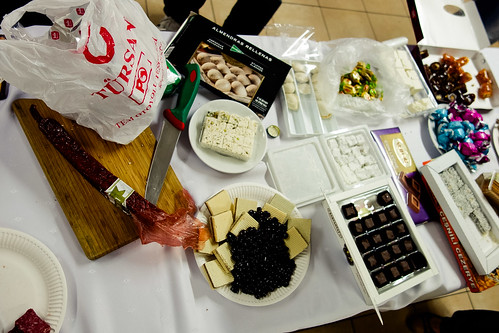
The first full session was on “Multiculturalism – what do we mean?” Here’s Laura’s live summary blog of the session, lead by Marcuz:
[Laura]
Marcuz:
What is multiculturalism? Multiple cultures / double cultures. Cultural diversity.
What is culture? Easiest definition is that it’s some kind of a flow – like a river, which can come up to another river and create a new river.
The “normal” culture we have plus 1. Plus 1 can be anything depending on how you choose to translate it within your context.
We always have assumptions that this extra culture has a meaning. If I say “yeah I’m Swedish plus I have an African father” – boom! then you know how to dance. Plus 1 extra plus.
This term is being applied differently in the context of media – if multi-cultural media plays alternative music this is the opposite of the majority, so everything that is minority becomes the alternative, or becomes multi-cultural. It becomes different. The minority exists only in relation to the majority. Multi-cultural media is minority vs majority – the minority can never become the majority.
Not many people are aware that what is majority culture now was minority culture in the past, but the American culture is a result of different flows coming together. In the same way our own cultures flow forward. If you would ask anyone about typical Swedish food they would say pasta bolognaise. For the younger generation kebab is as Swedish as it gets. Some things are always acceptable, and some things we will always reject.
“Just because I bring in the kitchen doesn’t mean I have to bring in the cook.”
When we get influences from outside we have to protect what is ours – some people say if there are too many immigrants, Norway will no longer be Norweigan. Who will take it over? The foreigners, the refugees, the immigrants, they say. People often forget they were immigrants themselves.
If multiculturalism becomes normal, it becomes the majority.
We are saying that in some societies we do like it to be extra, more multiculturalist. For me it makes sense to be Swedish and Christian, that goes hand in hand, but to others it doesn’t, Swedish is one thing and Christian is another thing. There is a Jewish / Norweigan identity, but some people would deny this.
“We are a very tolerant society, but if you don’t behave like us, you can go back where you bloody came from”

Same sex partners showing love and affection is still considered a problem in many countries – it’s big! Indigenous peoples in countries – there’s an idea that fine, they can exist, as long as I don’t have to see them.
People with disabilities – why are we building lifts everywhere? It’s not my fault they are how they are.
Multi-culturalism is usually connected to ethnicity in Sweden, but in other countries it’s connected to other issues that are not “normal”. Disabilities, gender etc.
Migration is perfectly normal – we have always done it. There are borders but it has always been normal. In nature, things migrate.
We still have dreams – all these things we want, and some of us will pay a lot for that. We are always growing – from being North Europeans we become Europeans. Everybody’s closing up together, we are becoming Europeans. It makes it important for us to show our borders. We have to build up these walls to protect ourselves. We used to keep our Finnish culture Finnish. Now we keep our Europe European.
Are you aware of the term Fortress Europe? Slowly slowly slowly but please take your time, because the fewer people who enter the better.

Multiculturalism leads to other things – there is a strength to being different, you can still achieve things. I’m different in my society but when I travel out I find the other different people and we can join together.
The European multiculturalist identity exists for some people, and for some it doesn’t. Some say it’s a utopia but it will never exist because we will always be Germans, Swedes, English…
You go to Germany and there are a group who are not considered German. They will always remain second class citizens. Religion plays a huge role for some people, as well, some religions are acceptable and some are not.
The European heteronorm is that you’re supposed to be straight, white and Christian, and everything else becomes a problem. “You should also be a man, that’s the best“. For that person most doors in to society will always be open. [Steve – this is a slightly expanded definition of heteronormativity, which is specifically a gender issue, but is strongly connected to
There are some particular problems associated with being Muslim, but as a Christian do I have a particular view of them due to my beliefs?
If you think of all the movies you saw as a kid, the enemies don’t fit the heteronorm. 50 years ago they were a Jew, then they were Eastern Bloc, then dark skinned with brown hair. When I was a kid we always played cowboys and indians, of course we were always the cowboys.
[Q from the group] – was there a similar study done in black cultures? Would a black child choose a black doll?
[marcuz’ answer] – back then there was no black culture, if you found a doll in Africa it was probably white. We would not have considered them to have their own culture.
[Marta]
Shared a story about a kindergarten in Poland where the people in charge wouldn’t accept black dolls for the children to play with – they said they weren’t dolls.
Have you noticed, especially talking on a political level, it’s very out of date to talk about multiculturalism, it’s inter-culture. In academic, media and political areas it’s politically correct and useful to use inter-culture.
Multiculturalism implies a separation – you do your stuff, I do my stuff, as long as we don’t fight with each I can live like that. Some people say cross-culture, we have a relationship but we judge each other, we don’t want to learn from each other. Then inter-culture is when you interact with each other, you learn, you question why you do things and compare, possibly changing what you do. People are relations, they can unite, they have connections.
What happens is the more you think about it, the more superficial it gets. It’s just a term.
On the European level and on the National level sometimes, the politicians blame certain issues (riots, etc) on multiculturalism, saying these things happen because we invited immigrants in to the country. Some say yes, we have certain problems because we have ended up with a multi-cultural society, but we are aiming for an inter-cultural society where we will co-exist and have interactions. Some politicians just switch one term for another but they have distinct meanings.
[Marcuz]
Eurovision – “We Are One” tagline – they are seeking an inter-culturalist society but watching it becomes a very multi-cultural activity because you want your own country to do well. It’s a Nationalist experience. We still vote for the countries that were close to us. When Norway gave the Swedish song 12 this year it was so obvious they were voting on a cultural basis. Some people watch with cultural glasses, some vote for the performance.
In many countries they like Balkan music but aren’t interested in Balkan society. Some people really want to go to Thailand but it’s just for the weather, they’re not interested in the Thai people or their culture.
If we feel something is threatening our country, we have to defend ourselves. Nationalist groups exist all over Europe and there are different kinds. I can have a patriotic sort of Nationalism or an ethnic Nationalism. Defending the economy, defending the ethnicity. In the areas around Fortress Europe ethnicity becomes even more important.
In times like these when we’re also mixing cultures these groups proliferate. When things are changing fast, people look at the past and think it was so much better back then. The good old Europe / fashions / cultures. The Nationalist groups are defending their ethnicity but also their cultures.
Other blocs defending something themselves – freedom of speech. You’re a defender but you’re also a reactor. Eg US out of Iraq Now group.
There is martial law in the suburbs of Northern Stockholm right now. The other week people were celebrating winning the hockey, but 20 minutes on the train and you’d have been in the middle of the riots. People almost didn’t care as long as it wasn’t in their own back yard. Let them kill each other, they said.
Yes, multi-culturalism means different things in different societies. People with disabilities, Roma people, women who are not allowed to work because they have to take care of children and they don’t have a choice…when someone is marginalised you can usually apply these ideas – but this training course is about suburban areas and we want you, because many of you work in these suburban areas where there is marginalisation, to apply these to what you’re doing.
We usually link all this to people who are poor, people who don’t know the language / culture, people who are from somewhere else – we put them together in the one group even though in this group there are often people who work twice as hard as everyone else. We talked earlier about people who will never fit in anyway because of their name, the way they look. They will still not get the job. Can you blame them for burning up a car at the end of the day?
All of you are experts in your own reality – so who am I to tell you what you’re doing is right or wrong? You’re stuck in it – but when we get together we can discuss it all and try to learn from each other. Let the ceiling be high and hopefully we can get somewhere. The things you understand – take it! The things that pass you by, that’s ok too.
The Death Of Margaret Thatcher
I posted this over on Facebook, but that’ll vanish, and lots of people aren’t on FB, so I’ll put it here too, in case it’s useful.
What a weird day. Thatcher dead. I’ve long wondered what today would feel like. I can’t celebrate anyone’s death, but there’s a weird mix of catharsis that the architect of so much evil is gone, mixed with the tragedy that her worst ideas are alive well and multiplying like a virus.
I just wish she’d lived long enough to see us collectively reject everything she ever stood for.
As for sympathy and ‘respecting dignity’. Yup, I have sympathy for everyone still living in an ex-mining community mired in poverty, for the mothers of the disappeared who saw Pinoche embraced by Thatcher, for the victims of apartheid fighting the South African racists at a time when she branded Mandela a terrorist. I have a whole shit load of sympathy today, and am still asking for the same missing dignity that we’ve been asking for for 3 decades, for all those victims of regimes she backed, or policies she brought about, few of whom could afford a funeral.
She’s gone, but the repugnant hate-filled divisive politics she brought about are stronger than ever. Fight that. No need to get distracted by the sad death of a senile old lady.
Diaspora – A New Way To Do Social Media?
It’s been around for a while, but it feels like the time for Diaspora is now.
It started with a Kickstarter project that aimed to raise $10K but actually made $200K, and the basic idea is that it will eventually be a fully self-hostable social network – instead of everything being a on centrally owned/controlled server, you’ll be able to use it just like any other social network to talk to people all over the world (on any of the ‘hubs’) but you’ll be able to own all your own data.
Here’s Why That Matters:
The Social Web as we know it is, for the most part, a corporately owned commercial space. We aren’t the customers, we’re the bait to bring in the customers – the advertisers. Any attempt to make sharing of our thoughts, ideas, location, photos, info easier is so that there’ll be more data to sell, both for ever more sharply targeted adverts (increased value of each ad and – the theory goes – more ‘useful’ to us.) The data that is scraped is also, on occasion, made available to pollsters, the police, governments… whoever is either willing to pay for it or demand it (and I’m sure legislate more favourably in the interest of the multi-billion dollar companies that run the networks).
All in, the ‘business’ of social networking runs entirely counter to what we users actually want from it, and the only thing we’re constantly told is that the advertising is the price of it being ‘free’. Sadly, we’re never given the option of buying our way out of the surveillance side of things – I’d pay seriously good money for Twitter to leave my network the hell alone and let me get on with talking to the people I care about without being bothered by ‘trends’ and ‘promoted tweets’. There’s pretty much nothing about the way Facebook conducts itself that I find admirable or positive. Twitter seem slightly more reticent to break the service that everyone has fallen in love with, but the gradual creep of trying to glean and sell aggregate data, rather than just let us pay to not be a part of it is deeply troubling.
But they’re not in the business of “social networking”. They’re in the business of selling MASSIVE amounts of data. Allowing the smart ones to opt out, even at a price, damages the data set.
Pretty messed up, eh?
So, What Do We Do?
We take the power back. We move to services where we own and manage our own data. Where privacy is as important as data portability, where there’s no advertising, just the chance to talk to and share with the people we actually want to listen to. Of course, those are still fantastic spaces for discovering things we may end up spending money on – if I need a recommendation for anything I’m shopping for, my twitter friends are the first people I ask. But invariably, I get some spamming dickhead try and sell me their version of whatever it is I’m talking about, regardless of the fact that I have a bunch of trusted friends whose opinion I care about.
Diaspora is in its infancy. BUT they’ve got (in my opinion) the most important bit right – the interface is clean, well designed and usable. Most ‘open source’ solutions suffer from a crisis of ugliness (the open equivalent to Twitter, at the moment, is Identi.ca but is so unbelievably ugly that I find it really difficult to use). Diaspora have fixed that.
What to do? Go to diasp.org and sign up. Then put ‘solobasssteve@joindiaspora.com‘ into the search box. You’ll find me. Add me. Tell your friends what your ID on there is (it’s always in the form of an email address like that – the first bit won’t necessarily find them…) And post it in the comments here.
Start sharing. It’ll take time to start to build a community. But it’s worth the effort. We need a place that’s ours, not owned by advertisers and spyware-peddling losers.

